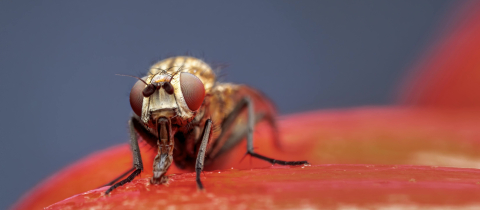This is due to a phenomenon known as superheating. First, we have to understand what boiling is all about. At the surface of a liquid molecules are always evaporating. If we leave a glass of water out, it will eventually disappear. If we heat the liquid, its molecules move faster, become more energetic and more molecules go into the vapour phase. As a consequence, the liquid disappears more quickly. At the boiling point, molecules all over the liquid, not only at the surface are energetic enough to go into the vapour phase. They do this most readily by evaporating into airspaces that exist in the container. All containers have imperfections where air gets entrapped when a liquid is introduced. As these air pockets fill with vapour, they expand and begin to rise. That is why we see streams of bubbles which originate at the sides or the bottom of the container.
In a microwave oven, the container is not heated, only the water. So the container actually cools the liquid in contact with it, meaning that the liquid in the center is always hotter, sometimes by as much as 10 degrees C. But the liquid in the center cannot boil, because there are no air bubbles for it to evaporate into. By the time the liquid near the edge of the container reaches the boiling point, the liquid in the middle is considerably hotter; it is superheated.
The addition of sugar or a tea bag now can spur vigorous boiling. This is because the surface imperfections introduce trapped air bubbles into which the superheated liquid vaporizes. Sometimes just picking up the container can have an explosive effect as the superheated liquid comes into contact with air bubbles on the periphery. Accidents can be prevented by putting a plastic spoon into the mug or glass while it is heating in the microwave. If you are concerned about chemicals leaching out from the plastic spoon, which I am not, you can use a glass rod. In this case, the scare-mongering note about “exploding coffee” may actually have some basis in fact.
Want to comment on this article? Visit our FB Page!







